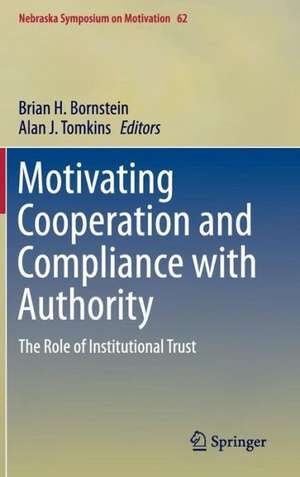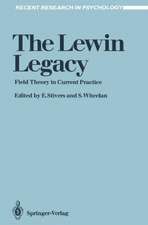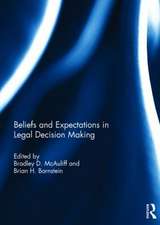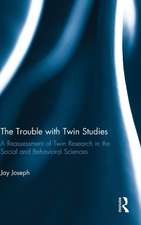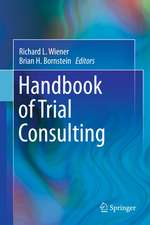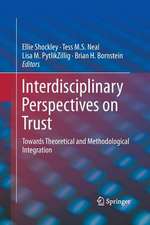Motivating Cooperation and Compliance with Authority: The Role of Institutional Trust: Nebraska Symposium on Motivation, cartea 62
Editat de Brian H. Bornstein, Alan J. Tomkinsen Limba Engleză Hardback – 19 mai 2015
Din seria Nebraska Symposium on Motivation
-
 Preț: 219.43 lei
Preț: 219.43 lei -
 Preț: 356.35 lei
Preț: 356.35 lei -
 Preț: 367.50 lei
Preț: 367.50 lei -
 Preț: 185.28 lei
Preț: 185.28 lei -
 Preț: 364.62 lei
Preț: 364.62 lei -
 Preț: 361.14 lei
Preț: 361.14 lei - 15%
 Preț: 637.28 lei
Preț: 637.28 lei -
 Preț: 398.42 lei
Preț: 398.42 lei -
 Preț: 362.11 lei
Preț: 362.11 lei - 15%
 Preț: 643.00 lei
Preț: 643.00 lei - 15%
 Preț: 639.73 lei
Preț: 639.73 lei - 15%
 Preț: 642.51 lei
Preț: 642.51 lei - 15%
 Preț: 640.88 lei
Preț: 640.88 lei - 15%
 Preț: 637.13 lei
Preț: 637.13 lei - 20%
 Preț: 551.32 lei
Preț: 551.32 lei - 15%
 Preț: 639.73 lei
Preț: 639.73 lei - 15%
 Preț: 641.85 lei
Preț: 641.85 lei - 15%
 Preț: 639.73 lei
Preț: 639.73 lei - 18%
 Preț: 1003.70 lei
Preț: 1003.70 lei - 18%
 Preț: 786.98 lei
Preț: 786.98 lei - 18%
 Preț: 893.40 lei
Preț: 893.40 lei - 24%
 Preț: 732.54 lei
Preț: 732.54 lei - 18%
 Preț: 727.90 lei
Preț: 727.90 lei - 18%
 Preț: 783.98 lei
Preț: 783.98 lei - 18%
 Preț: 889.29 lei
Preț: 889.29 lei -
 Preț: 440.04 lei
Preț: 440.04 lei -
 Preț: 396.82 lei
Preț: 396.82 lei -
 Preț: 216.31 lei
Preț: 216.31 lei -
 Preț: 438.90 lei
Preț: 438.90 lei -
 Preț: 439.05 lei
Preț: 439.05 lei -
 Preț: 404.28 lei
Preț: 404.28 lei -
 Preț: 434.74 lei
Preț: 434.74 lei -
 Preț: 250.75 lei
Preț: 250.75 lei -
 Preț: 219.61 lei
Preț: 219.61 lei
Preț: 643.65 lei
Preț vechi: 757.24 lei
-15% Nou
Puncte Express: 965
Preț estimativ în valută:
123.20€ • 133.87$ • 103.56£
123.20€ • 133.87$ • 103.56£
Carte tipărită la comandă
Livrare economică 22 aprilie-06 mai
Preluare comenzi: 021 569.72.76
Specificații
ISBN-13: 9783319161501
ISBN-10: 3319161504
Pagini: 250
Ilustrații: XIII, 220 p. 20 illus., 15 illus. in color.
Dimensiuni: 155 x 235 x 17 mm
Greutate: 0.51 kg
Ediția:2015
Editura: Springer International Publishing
Colecția Springer
Seria Nebraska Symposium on Motivation
Locul publicării:Cham, Switzerland
ISBN-10: 3319161504
Pagini: 250
Ilustrații: XIII, 220 p. 20 illus., 15 illus. in color.
Dimensiuni: 155 x 235 x 17 mm
Greutate: 0.51 kg
Ediția:2015
Editura: Springer International Publishing
Colecția Springer
Seria Nebraska Symposium on Motivation
Locul publicării:Cham, Switzerland
Public țintă
ResearchCuprins
1. Institutional Trust: An Introduction.- 2. Would Trust by Any Other Name Smell as Sweet? Reflections on the Meanings and Uses of Trust across Disciplines and Context.- 3. Trust as a Leap of Hope for Transaction Value: A Two-Way Street above and beyond Trust Propensity and Expected Trustworthiness.- 4. Creating Legitimacy: The Interrelated Roles of Justice and Trust.- 5. Legitimacy Is for Losers: The Interconnections of Institutional Legitimacy, Performance Evaluations and the Symbols of Judicial Authority.- 6. Who Trusts the Trial Courts, How Much and Why?.- 7. On the Dual Motivational Force of Legitimacy.- 8. Political Trust in Polarized Times.- 9. The Epistemic Contract: Fostering an Appropriate Level of Public Trust in Experts.- Robert J. MacCoun.
Notă biografică
Brian Bornstein is Professor of Psychology and Courtesy Professor of Law at UNL. He started at the university in 2000. He is a member of the Law-Psychology, Social, and Cognitive psychology programs. He has served as Interim Director of the Social-Personality and Law-Psychology programs and is presently Associate Director of the Law-Psychology program. He received his Ph.D. in psychology from the University of Pennsylvania in 1991 and a Master of Legal Studies from the University of Nebraska in 2001. Dr. Bornstein's research efforts focus primarily on how juries, especially in civil cases, make decisions, and the reliability of eyewitness memory. Additional areas of focus are in applying decision-making principles to everyday judgment tasks, as in medical decision making and distributive and procedural justice. He teaches courses on human memory, psychology and law, decision making, and history of psychology at the graduate and undergraduate levels. His latest books are the Handbook of Trial Consulting (co-edited with Richard Wiener, Springer Publishing, 2011) and Trauma, Stress and Wellbeing in the Legal System (co-edited with Monica Miller, Oxford University Press, 2013). He is co-editor of the journal Psychology, Crime & Law, the NYU Press Psychology & Crime book series, and the Springer Advances in Psychology & Law book series.
Alan Tomkins is the Director of the University of Nebraska Public Policy Center, located off-campus at the Lincoln Community Foundation Building (215 Centennial Mall, South, Suite 401, Lincoln, NE 68588-0308). He was named director when the PPC was created in July, 1998. Dr. Tomkins is also a Professor in the UNL Law/Psychology Program.
Dr. Tomkins received a B. A. degree from Boston University (1975) with a joint major in Psychology and Philosophy. He earned a J. D. and Ph.D. in Social Psychology from Washington University in St. Louis in 1984. He joined the faculty of the Law/Psychology Program at the University of Nebraska-Lincoln in 1986. Prior to coming to UNL, Dr. Tomkins was a Research Associate at the Federal Judicial Center, a Visiting Assistant Professor of Psychology at the University of Illinois, Urbana-Champaign and a Research Assistant Professor at St. Louis University. He also has served as a Visiting Professor of Law at the University of Southampton (England) and as a Visiting Scholar of Psychology at Yonsei University (Seoul, Korea). In 2005-06 Tomkins served as William J. Clinton Distinguished Fellow at the University of Arkansas Clinton School of Public Service while also continuing as director the Public Policy Center.
His policy research interests include mental health policy, community health and human services, the use of information for decision making, and stakeholder input into the policy process. Dr. Tomkins is co-editor Court Review, the journal of the American Judges Association. Previously, he served as co-Editor and then Editor of the interdisciplinary journal, Behavioral Sciences & the Law from 1989-2001 and served on the editorial board for Law & Human Behavior since 1991 and on Expert Evidence: The International Digest of Human Behaviour Science and Law from 1998-2001. He is a Fellow of the American-Psychology Law Society, Division 41 of the American Psychological Association.
Alan Tomkins is the Director of the University of Nebraska Public Policy Center, located off-campus at the Lincoln Community Foundation Building (215 Centennial Mall, South, Suite 401, Lincoln, NE 68588-0308). He was named director when the PPC was created in July, 1998. Dr. Tomkins is also a Professor in the UNL Law/Psychology Program.
Dr. Tomkins received a B. A. degree from Boston University (1975) with a joint major in Psychology and Philosophy. He earned a J. D. and Ph.D. in Social Psychology from Washington University in St. Louis in 1984. He joined the faculty of the Law/Psychology Program at the University of Nebraska-Lincoln in 1986. Prior to coming to UNL, Dr. Tomkins was a Research Associate at the Federal Judicial Center, a Visiting Assistant Professor of Psychology at the University of Illinois, Urbana-Champaign and a Research Assistant Professor at St. Louis University. He also has served as a Visiting Professor of Law at the University of Southampton (England) and as a Visiting Scholar of Psychology at Yonsei University (Seoul, Korea). In 2005-06 Tomkins served as William J. Clinton Distinguished Fellow at the University of Arkansas Clinton School of Public Service while also continuing as director the Public Policy Center.
His policy research interests include mental health policy, community health and human services, the use of information for decision making, and stakeholder input into the policy process. Dr. Tomkins is co-editor Court Review, the journal of the American Judges Association. Previously, he served as co-Editor and then Editor of the interdisciplinary journal, Behavioral Sciences & the Law from 1989-2001 and served on the editorial board for Law & Human Behavior since 1991 and on Expert Evidence: The International Digest of Human Behaviour Science and Law from 1998-2001. He is a Fellow of the American-Psychology Law Society, Division 41 of the American Psychological Association.
Textul de pe ultima copertă
This volume explores the various ways that trust is thought about in contemporary society and studied by social scientists. Specifically, it focuses on the role of trust as a major contributing factor in compliance with authority. Cross-disciplinary research findings by leading experts link new ways of looking at trust and its measurement to emerging areas for understanding and fostering cooperation with such entities as governments, law enforcement, the courts, and scientists. These multiple viewpoints help to explain why trust remains hard to define across disciplines, as chapter authors explore the role of morality in compliance, political implications of trust, and key trust-related concepts such as legitimacy, justice, and risk. In addition, the book explores the nuanced relationship between institutional and interpersonal trust.
Included among the topics:
Included among the topics:
- Reflections on the many meanings and uses of trust.
- The interrelated roles of justice and trust.
- Who trusts the trial courts, how much, and why?
- On the dual motivational force of legitimacy.
- Political trust in polarized times.
- Fostering an appropriate level of public trust in experts.
Caracteristici
Fosters a truly interdisciplinary dialogue about trust and confidence Advances both theoretical and methodological perspectives on trust Includes practical advice on how best to conduct empirical research on institutional trust
